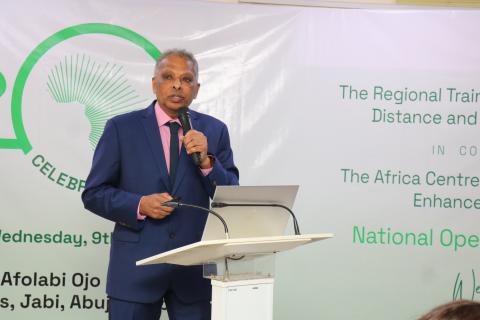
As the global education system continues to gravitate towards more online learning and less in-person classroom time, a Principal Associate, Technology, Education and Design Associates, Melbourne, Australia, Prof. Som Naidu, has advocated for the evaluation of teaching approach and student learning experience.
Naidu said such evaluation requires a fundamental change in approach to one that shifts the focus from surface features to deeper structures of teaching.
“For a future-focussed education, rethink and recalibration of educational as well as institutional choreographies is required,” he said.
The Principal Associate made this known on Tuesday, August 8, 2023 during a 2-day Guest Lecture and Round-table Discussion to commemorate the Regional Training and Research Institute for Distance and Open Learning’s (RETRIDOL), two decades of existence, in collaboration with The African Centre of Excellence on Technology Enhanced Learning (ACETEL), held at the National Open University of Nigeria (NOUN) headquarters, Jabi, Abuja.
Speaking on the topic, ‘Reimagining Education Futures at the Intersections of Technology, Education, and Design,”Naidu said “It is not just campus spaces that are changing; all university functions are being reimagined, which is creating demand for new and expanded digital services in teaching, research and administration.
“A more rigorous approach must include a focus on more than one’s teaching actions. In order to achieve this focus, evaluations of teaching need to focus on its design, efficiency, effectiveness and its capacity to engage.”
According to the renowned educationist, design comprises a consideration of the underlying intentions and beliefs about teaching, while efficiency is about the execution of the designed learning and teaching experiences.
The erudite scholar added that effectiveness is concerned with the impacts and results of teaching on students and their learning experiences while capacity to engage is determined by the teacher’s ability to articulate clear learning outcomes, design challenging learning experiences for their achievement, and identify and collect suitable learning resources which altogether have the potential to motivate learners and promote engagement with the learning experience.
On the roles of education, he said: “Education for all is fundamental to creating a peaceful and prosperous world. Education gives people the knowledge and skills they need to stay healthy, get jobs and foster tolerance.”
Continuing, Naidu said that the tools and technologies available to teachers will continue to be changing, both in the conventional classrooms, and in the distance education and online world.
L-R: Professor Carlos A. Pereira d Oliveir,Prof. Mercy Ogunshola andEmeritus Professor Olugbemiro Jegede (Discussants),Prof. Francis Egbokahre (moderator)
“In this regard teachers will always have to be up-skilling themselves in order to be effective and efficient, and making the most of the affordances of contemporary tools and technologies regardless of their educational context,” he said.
Highlight of the 20th Anniversary event was the Round-table Discussion, which had erudite personalities, likes of Emeritus Professor Olugbemiro Jegede,Professor Carlos A. Pereira d Oliveira and Prof. Mercy Ogunshola, as discussants, while Prof. Francis Egbokahre as the moderator.
Some of the response key points from the discussants include: the need to develop content and design that can help students apply them in the fast-changing world, teachers must change, learners must change, and classrooms must change. The new norm after Covid-19 is changing as already pointed out in the lecture.
Adopting the use of technology appropriately to achieve desired goals, educational curriculum must be designed to meet the teacher/learner ratio to reduce the workload, was also pointed out.

